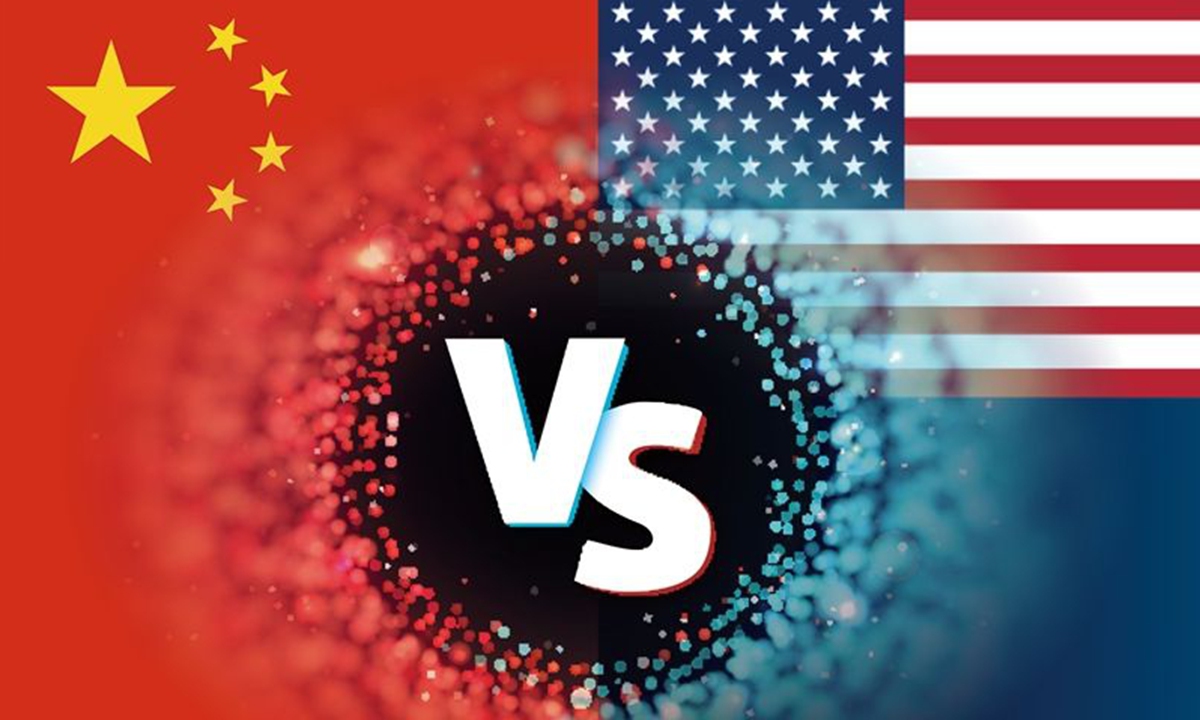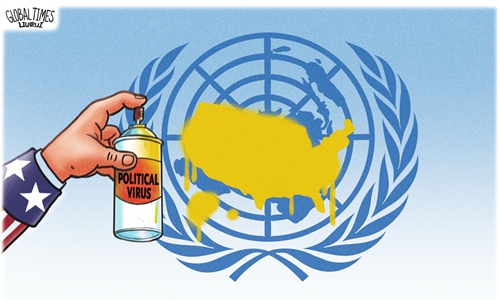Avoid misunderstanding of major power relations in post-West era

China US Photo:GT
On the last page of his famous book The Rise and Fall of the Great Powers, Paul Kennedy quotes Otto von Bismarck, the first chancellor of the German Empire, saying that, "all of these Powers are traveling on the stream of Time, which they can neither create nor direct, but upon which they can steer with more or less skill and experience." Kennedy's open-ended predictions about great power relations are being unveiled as the 21st century enters its third decade. The major powers are facing
changes not seen in a century.
From the perspective of power structures, the traditional North Atlantic-centered structure of relations is entering a post-Western era. The decline of US hegemony is a global consensus. The comprehensive national strength of European countries has declined too, and in a way not seen in 1,500 years. Countries like China, India, and Southeast Asian countries that used to be on the fringes of the world stage now are moving to the center.
It is conceivable that in the next decade, the tug-of-war between the great powers in the East and West will become more intense. This will especially take place as the competition between China and the US heats up. However, China promotes great power relations based on good neighborliness, equal consultations, and mutual benefits, and win-win results. Therefore, in the post-Western era, the key to the steady development of great power relations will be the construction of economic integration, particularly with countries along the Western Pacific coasts. It will also need new mechanisms for multilateral cooperation.
From the perspective of forms of contests, traditional major power relations based on peace or war is entering a post-military era. Instead of the arms race, suppression by force, or containment through alliances, contests between great powers in the new era will gradually focus on a low political level, intensity, and casualties. This may include competition in public opinion, technology innovation, climate change, digital economics, and so on.
In fact, since the middle of the last century, all the major powers have maintained long-standing non-war relations. Tensions between the West led by the US and the non-West represented by China will become the new norm in great power relations for a long time. But the possibility of a hot war between the great powers, especially a military conflict between China and the US, is still quite low.
From the perspective of interaction rules, the traditional trajectory of great power relations with national authority as the main body is entering a "post-government era." The role of government in the trajectory of global governance and transnational interaction remains the most important. But its leadership has been diluted. International organizations, multinational corporations, the private sector and even mass media are all becoming indispensable actors in world politics. The arena of major-country relations has become crowded, and is also colorful.
Just as tensions between China and the US cannot prevent the exchanges of trade, investment, people and information between the two countries, governments' will cannot dictate the entire trajectory of great power relations. In recent years, Western electoral politics has become decayed and farcical, which has further weakened the credibility of the government and national authority. In the post-government era, it becomes difficult to master the interaction rules of all-dimensional relations between the great powers. However, it also ensures stability and continuity of great power relations.
For a long time, people's views on the relations between great powers have been deeply influenced by the realistic theory of international relations, and the media's reports on international news tend to prefer the contents of fights. In this regard, we need to avoid three misunderstandings in the observation of great power relations.
The first is to avoid the "Western-centric trap" when observing major power relations. The West is still ahead of most countries, but its representativeness is long gone. To observe major-country relations, we should not only track the trends of Europe, the US and Japan. We also need to understand the details of regional major powers, key players and hot spots.
The second is to get rid of the anxiety of military conflict. Small-scale military conflicts still occur in some regions, but there is a horrible nuclear balance between major powers. The incalculable disasters that may bring by major military conflicts determined that the probability of military conflicts is small. Tensions between China and the US are nowhere as bad as those between Russia and the US over the past 20 years. They are different from that during the Cold War. Observers are advised to stay calm and not to hype up weapons and military affairs.
The third is to be on guard against the limitation of the "governmental perspective." The relationship between major countries is not just about government relations or political relations, but also about trade, investment, and technology. While it is important to track government policies, it is also necessary to see the full picture in each field.
The author is a professor and executive dean of Chongyang Institute for Financial Studies at Renmin University of China. opinion@globaltimes.com.cn


